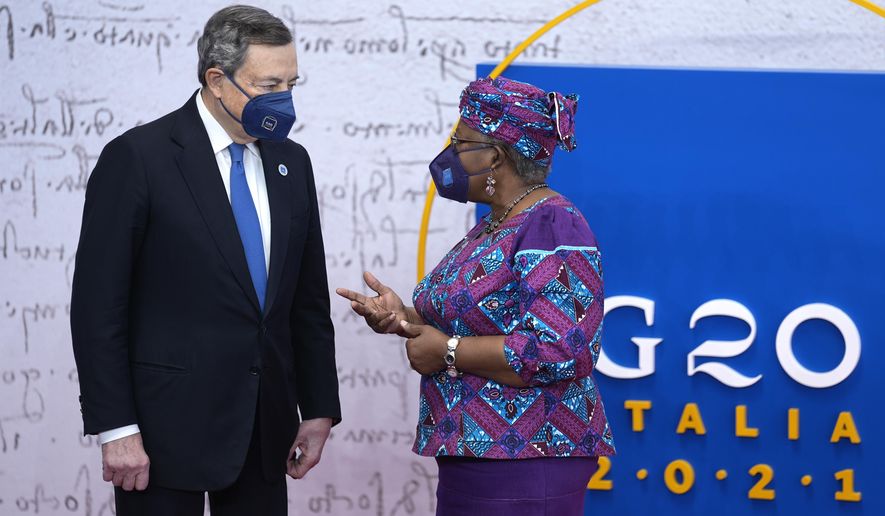ROME (AP) – Leaders of the world’s biggest economies on Saturday endorsed a global minimum tax on corporations as part of an agreement on new international tax rules, a step toward building more fairness amid skyrocketing revenues of some multinational businesses.
The move by the Group of 20 summit in Rome was hailed by U.S. Treasury Secretary Janet L. Yellen as benefiting American businesses and workers.
G-20 finance ministers in July had already agreed on a 15% minimum tax. Its formal endorsement at the summit Saturday in Rome of the world’s economic powerhouses was widely expected.
Yellen predicted in a statement that the deal on new international tax rules, with a minimum global tax, “will end the damaging race to the bottom on corporate taxation.”
The deal did fall short of U.S. President Joe Biden’s original call for a 21% minimum tax. Still, Biden tweeted his satisfaction.
“Here at the G20, leaders representing 80% of the world’s GDP - allies and competitors alike - made clear their support for a strong global minimum tax,” the president said in the tweet. “This is more than just a tax deal - it’s diplomacy reshaping our global economy and delivering for our people.”
On other issues crucial to fairness across the globe - including access to COVID-19 vaccines - the summit on the first of its two days - heard pleas to boost the percentage of those in poor countries being vaccinated.
Italian Premier Mario Draghi made a sharp call to pick up the pace in getting vaccines to poor countries as he opened a conference of the world’s powerhouse economies.
Draghi, the summit host, said Saturday that only 3% of people in the world’s poorest countries are vaccinated, while 70% in rich countries have had at least one shot.
“These differences are morally unacceptable and undermine the global recovery,” said Draghi, an economist and former chief of the European Central Bank.
French President Emmanuel Macron has pledged to use the summit to press fellow European Union leaders to be more generous in donating vaccines to low-income countries.
But advocates of civil society who have held discussions with G-20 officials said suspension of vaccine patents was crucial to increasing access in poor countries.
The summit is also confronting what is tantamount to what has been playing out as two-track global recovery in which rich countries are bouncing back faster.
Rich countries have used vaccines and stimulus spending to restart economic activity, leaving the risk that developing countries that account for much of global growth will remain behind due to low vaccinations and financing difficulties.
Macron has told reporters he expects the G-20 to confirm an additional $100 billion to support Africa’s economies.
Italy is hoping the G-20 will secure crucial commitments from countries representing 80% of the global economy - and responsible for around the same amount of global carbon emissions - ahead of the U.N. climate conference that begins Sunday in Glasgow, Scotland.
Most of the summit leaders in Rome will head to Glasgow as soon as the G-20 ends on Sunday afternoon. Russian President Vladimir Putin and Chinese leader Xi Jinping, whose efforts to reduce emissions are paramount to combatting climate change, were participating remotely in the Rome summit.
A recent U.N. environment report concluded that announcements by dozens of countries to aim for “net-zero” emissions by 2050 could, if fully implemented, limit a global temperature rise to 2.2 degrees Celsius (4 F). That’s closer but still above the less stringent target agreed in the Paris climate accord of keeping the temperature increase to well below 2 degrees Celsius (3.6 F) compared with pre-industrial times.
But mid-way through the summit it was the corporate tax rate rule that dominated was standing out as an accomplishment. It is aimed at preventing multinational companies from stashing profits in countries where they pay few or no taxes.
White House officials say the new tax rate would create at least $60 billion in new revenue a year in the U.S. - a stream of cash that could help partially pay for a nearly $3 trillion social services and infrastructure package that Biden is seeking. U.S. adoption is key because so many multinational companies are headquartered there.
But Civil 20, which represents some 560 organizations from more than 100 countries, in a network making recommendations to the G-20, were restrained in praise. The 15% rate is “a little more than those (rates) we’d consider fiscal paradises,” Civil 20 official Riccardo Moro told reporters.




Please read our comment policy before commenting.